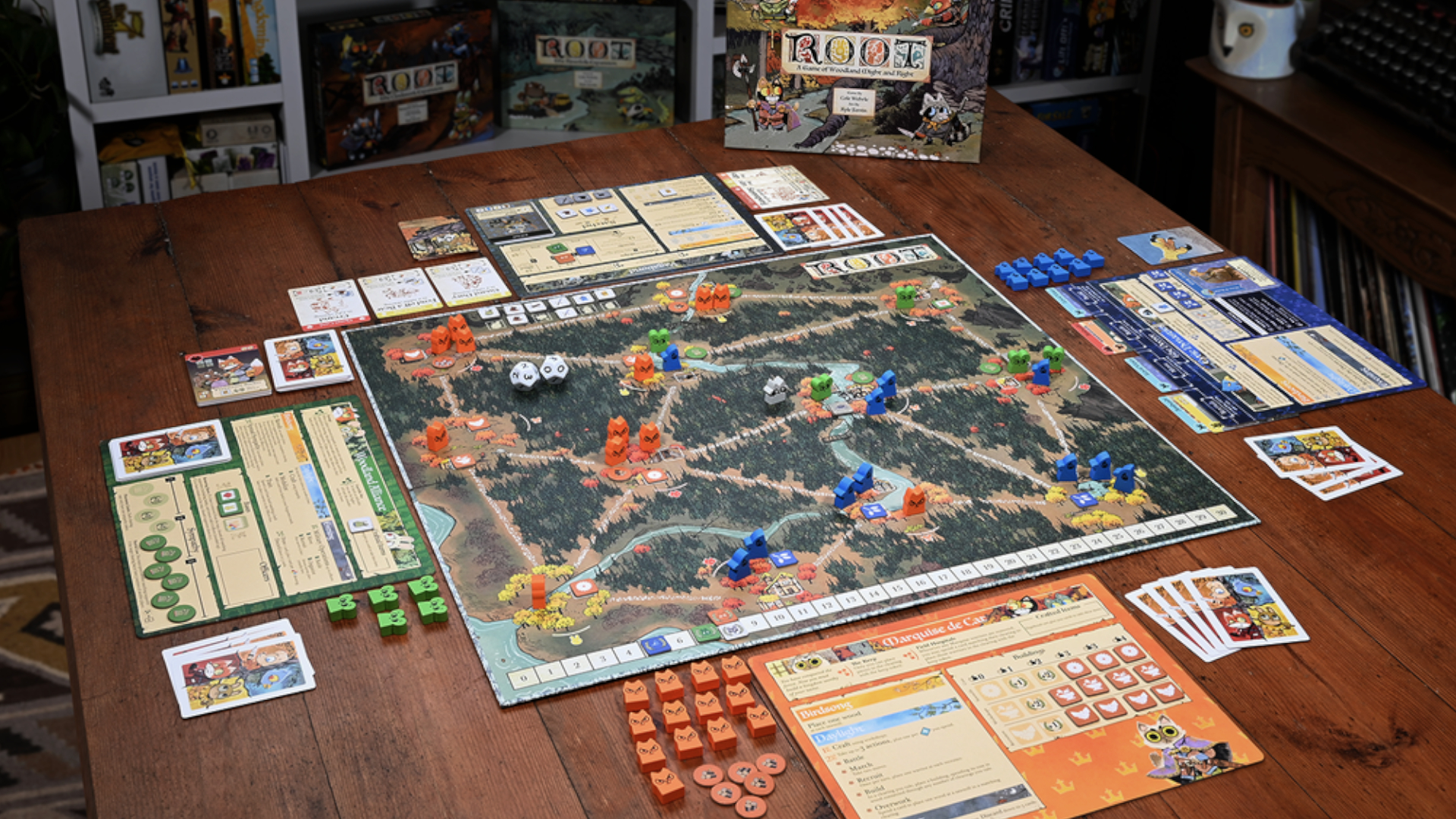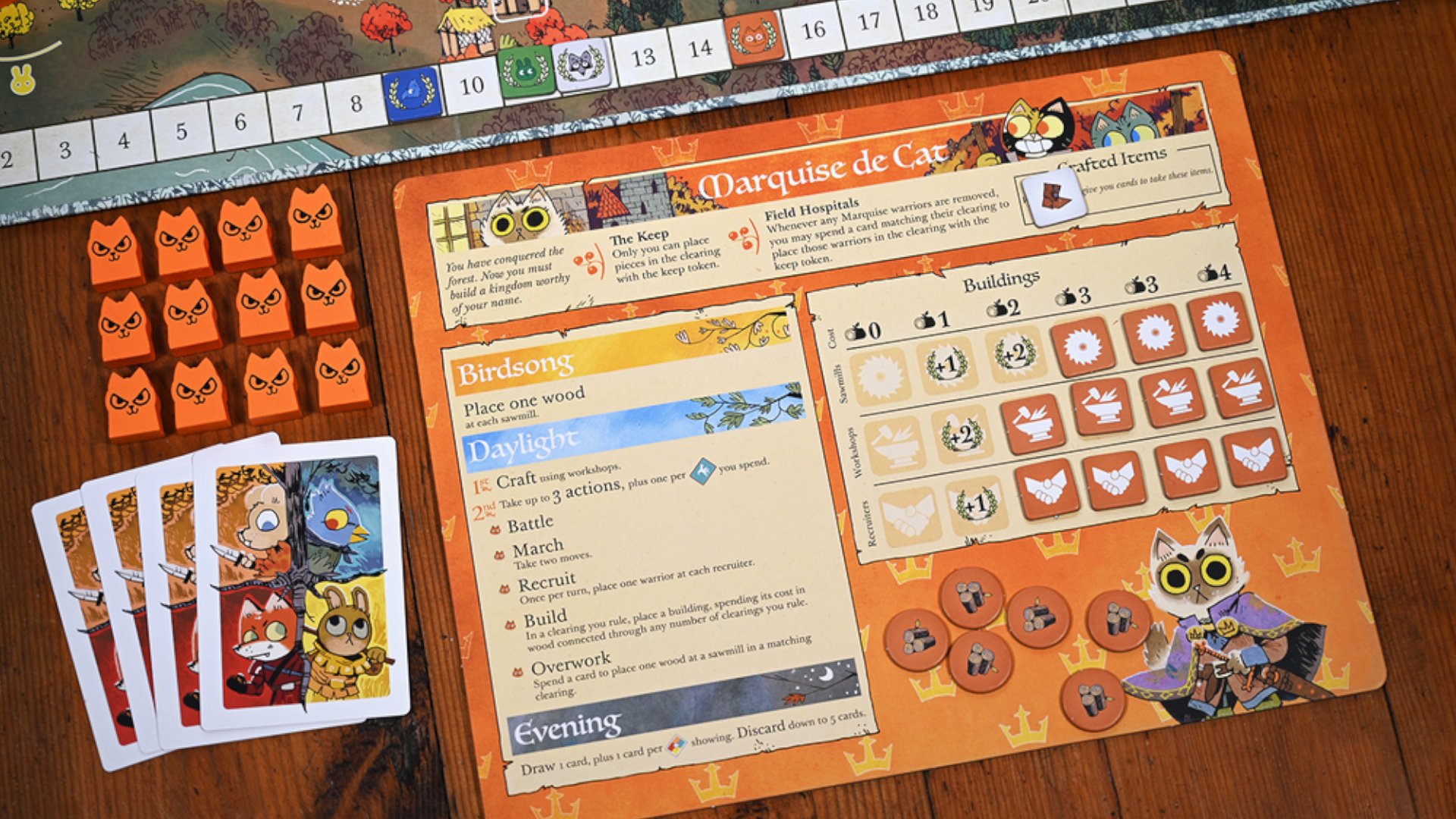GamesRadar+ Verdict
'Adorable' and 'wargame' rarely go together, but in Root they're like chocolate and peanut butter.
Pros
- +
Accessible wargaming
- +
Simple mechanics, deep strategies
- +
Adorable critters
Cons
- -
Hard on new players
- -
Best with 4 people
Why you can trust GamesRadar+
The Root board game brings us unhindered woodland warfare, nature red in tooth and claw... and broadswords. And crossbows. Don't let the adorable - and it is adorable - appearance deceive you; this is as cutthroat an experience as any other competitive wargame, and in the end, only side can claim victory. It'll take time to get your head around, but for fans of grand strategy, it's one of the best board games out there.
If you go down to the woods today
Much like the Redwall novels, the Root board game has animal factions squaring off to see who can control the great forest. However, this battle of 'Woodland Might and Right' is one of the most accessible yet complex wargames there is due to its structure. Each faction is asymmetrical and plays in a unique way, but has to follow certain basic rules.
What's more, Root gleefully cribs the best ideas from the last few decades of wargame development and packs them into a simple, cute package. The Marquis de Cat is playing a traditional wargame of economics. The Eyrie enacts delicate, planned area control. The Woodland Alliance is an insurgency, spreading its influence while avoiding major military conflict. Finally, the Vagabond is playing an adventure game amid the chaos, pitting sides against each other for personal gain.

It really helps new players that a fight is just a roll of the dice and a comparison of numbers. One look at the board and you can tell precisely how a battle might possibly turn out, exactly how many soldiers could be lost, and exactly what the stakes would be if you pick a fight. There's randomness, but it's of limited enough scope that Root doesn't feel like unpredictable chaos which hinges on a single dice roll.
That said, even though movement and combat are simple in the Root board game, players can get overwhelmed when choosing which of the many actions they should take for a spin. The Alliance and Vagabond may be overwhelming if you're a first-timer, for example.
In the years since its 2018 publication, my opinion of Root has only grown more positive
Root's production quality and design go a long way to solving that problem. The player boards are great, with a lot of useful information ready to reference, and the pieces have clear purpose.
Barrier to entry
Unfortunately, the ubiquitous cards needed by every player can be a bit confusing as they're dense with information. When does a card's suit matter, or its cost, or its rules text? Why is there a teapot on this one? Many of a new player's questions will revolve around cards.

If it's starting to sound like the Root board game has a barrier to entry, that's true. Though I called it "the most accessible complex wargame" above, it's still a complex wargame. Someone's first time playing will almost inevitably include confusion and perhaps frustration at their inability to compete. The experience difference between players matters almost as much as skill, and an inexperienced player in a key role, such as the Marquis or Woodland Alliance, can make the game not just fall flat, but run poorly overall. It's also more unstable when playing with two or three, rather than a full four players.
Root is therefore a superb game for a group that doesn't mind doing a dry run to learn the ropes
That same variance and asymmetricality are what make Root so compelling, though. I've never seen two games go precisely the same, and even the advent of an easily-played digital edition hasn't broken the game's balance. In the years since its 2018 publication, my opinion of Root has only grown more positive. While for a bit I was convinced it wouldn't last, I now consider it a permanent contender for a spot in the top tabletop wargames list - I even like the expansions (Clockwork, River Folk, and Underworld).
Root is therefore a superb game for a group that doesn't mind doing a dry run to learn the ropes, or one that will focus on single games over multiple sessions rather than break out a new game every hour for the whole play time. Players that have a good laugh over Scythe or Twilight Imperium, or even Risk, will find Root much to their liking.

Jonathan is an experienced freelancer writer who specializes in tabletop and strategy gaming.




